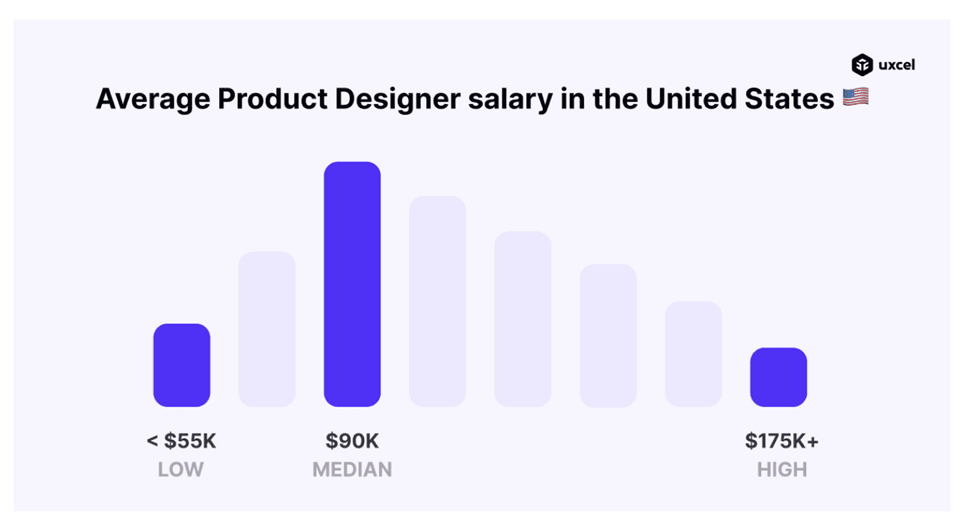Whether this is your first job or one of many, negotiating a salary is like pressing the comical, big red button that says ‘do not press’. You want to press it but there’s always a chance that doing so will result in something dreadful.
All product designers are a talented bunch that deserves financial recognition. However, asking for that financial recognition is difficult.
You worry that you’ll be stepping on the toes of those who’ve just picked you for the role. It feels like you are asking for more than what the business is able to afford. The mystery of a salary is often kept under wraps and it is a psychological nightmare that many will simply roll over and take - whether it’s a salary they wanted or not.
Despite this though, salary negotiating is often fruitful in its attempts. In fact, 85% of Americans who countered on salary or other compensation, got at least some of what they asked for.
Need the confidence to negotiate your first product designer job? Want to secure a salary that you desire or get as close to it as possible? This guide will provide you with all the arsenal required to successfully achieve a salary offer that befits your talents and experience as a designer.
Why is salary negotiation a challenging topic to broach?
Why is salary negotiation so unapproachable? Well, much of it is down to businesses simply not encouraging it. Some businesses simply don’t want to give the new starter an opportunity to bump up their salary. This is sometimes down to a lack of business funds available or to simply get more ‘bang for their buck’ at your expense.
As a product designer, the role is not one that everyone is able to do. It’s also one of the most in-demand roles for companies hiring in 2022. They’re the driving forces behind a lot of digital products from websites to mobile apps and tools that many of us use.
The art of negotiation is therefore something you want to master when securing your first product designer job. Yes, we know it’s easier said than done, but stay with us.
7 salary tips to consider when negotiating your first product designer job
In order to walk into that negotiation with confidence and determination, you need to be prepared. From the research you do beforehand to acknowledging when to walk away, here are several salary tips to consider when it comes to negotiating.
1. Do your research and compare product designer salaries online.
How much does the average product designer role earn? These averages vary depending on the location of the job, how much experience the product designer has, and the business itself.
However, averages are good to have. They provide you with a starting point for most negotiations, especially if it’s hitting where you want to be in your own salary expectations.

For insightful research, this article on product designer salaries is going to help provide some guidance on what is expected. However, while research is beneficial, being realistic and aware of what is considered appropriate, is essential.
With this in mind, here are a few pointers on what to look for when doing the research:
- Browse high-authoritative websites
- Filter search results to your location or country
- Consider the average given is accurate to the level of experience you have
- Identify salaries involving the company’s competitors
Research is valuable when it’s done well, which means following the above guidelines helps source the best information to use as evidence.
2. Know your worth.
It’s hard to define what an individual person’s worth is because everyone feels differently about how much they should be paid for their services. The research you do to understand the average salaries offered for this type of job is information you’ll need for knowing your own worth.
Knowing your own worth is based on a number of factors that include; how much experience you have, the job title being offered, location, etc. This will all provide the baseline that’s required when navigating a negotiation for the first time.
While knowing your worth is important, you don’t want to be presenting a figure that’s obscene in comparison to the market rate of the position you’ve acquired.
3. Be aware of salary ceilings.
One consideration to make when negotiating is a salary ceiling. Most businesses will have a salary ceiling. This is the financial point where they can’t go any higher. For a negotiation, it’s always important to be aware that the initial offer on the table, is likely to be slightly under the company’s salary ceiling for that role.

Why is this important? Well, it gives you some flexibility in how much is available to play with. The salary band for a product designer role varies depending on experience and so again, it’s important to be aware of what’s reasonable to ask for.
We’d recommend an increase of around 10-20% when it comes to negotiating a salary. That’s likely the point at which you’d hit the ceiling. For example, if the company offers you $86,000 for the role, you could ask for anything between $94,600 to $103,200.
4. Don’t be afraid to ask if nothing’s been mentioned initially.
You’re coming to the end of the initial interview and nothing has been mentioned about salary expectations. That’s where ‘do you have any questions?’ is a good opportunity to play your hand and trigger the negotiation process. They could decide to tell you it there and then, or they may wait until they offer you the job officially.
Either way, it’s something that you shouldn’t be afraid to ask for. After all, it’s not a question they’ll take offense to.
5. Provide evidence behind your reasoning.
As with any negotiation, evidence is key. This is the same when it comes to renegotiating an existing contract in place. There needs to be evidence to support your reasoning for a salary increase.
Not all businesses are expecting you to salary negotiate and if you do, they won’t expect most to provide valid evidence.

When presenting your findings, consider what research you’ve done and what that proves. Touch on your previous experience and work and why that holds more value. You want to give convincing evidence that will leave the interviewers reconsidering their initial figure.
This is something that you’ll want to have readily available as and when the negotiation happens. Again, the negotiation could happen at any point. From that initial interview to getting handed the official contracts to sign, be ready to present your reasons as to why the salary needs to be increased.
6. Know when to push back.
Pushing back is risky but sometimes it feels right to do so. Pay attention to what the business has offered and whether they’re indicating that there’s some wiggle room left.
Ideally, if the offer you’ve asked to increase has come through and it’s not too far off your desired salary, counter offer.
However, if it’s too far off what you’re expecting, it’s wise to accept the offer. It may be that you look to review your salary after a year or two of showing your worth to the company.
7. Remember - you can always walk away.
Of course, there are those salary offers that are way off the pay that you deserve. There are also some companies that are simply not willing to negotiate.
While that is fine for some, it’s not the case for everyone. Remember this - you can always walk away.
We often think that the business conducting the hiring process holds all the power. In fact, there’s an equal power balance at play. As a candidate, you are able to turn down the offer and walk away.
It’s not something that always happens but you never know, it could spur a last-minute counteroffer that meets your demands.
The benefits of salary negotiation
There are many benefits of a salary negotiation that give reasoning to ask for it. Confidence to do it is often the top reason why people don’t negotiate.
Knowing the benefits will give you the confidence boost needed to ask. Here are some of the reasons why you need to opt-in for that salary negotiation.
- It shows you’re willing to speak up for yourself
- Gives you the opportunity to get paid what you deserve
- Indicates to you whether the business is up for negotiations or not
- Shows the business values its employees
Be bold and brave when it comes to salary negotiation
Knowing your worth and value as a product designer is something the be proud of. While not all businesses may wish to negotiate, there are those that will. The odds are positive when it comes to salary negotiation so it’s certainly something that is a part of the hiring process.
Pick the moment where it seems most appropriate, use your gut, and hopefully, you’ll secure a salary you deserve and want.









